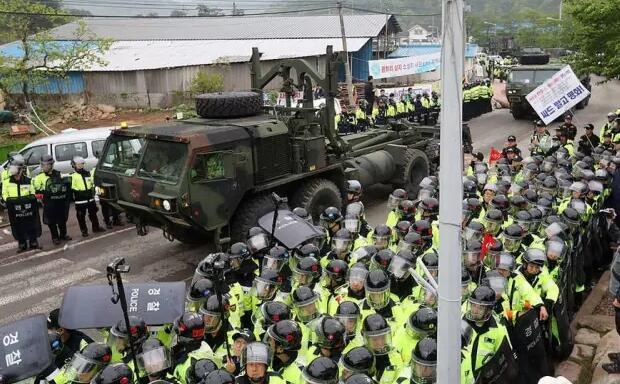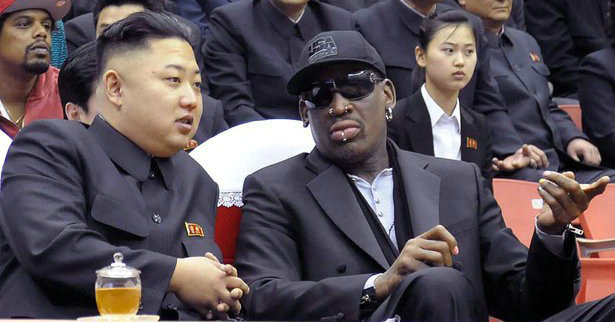


South Koreans protest deployment of the Terminal High Altitude Area Defense (THAAD)
The Trump Administration seems to be testing the U.S.-South Korea relationship at time when South Koreans are seriously debating the future of the alliance.
According to a poll by Research Plus that was commissioned by the Hankyoreh newspaper, the majority of South Koreans are either opposed to the THAAD deployment itself or feel how it is being rapidly deployed is a problem. Among those who support the THAAD deployment, close to 93 percent said that the U.S. should be the one who foots the bill.
China has repeatedly expressed its opposition to THAAD, saying that it disrupts regional strategic balance and is not conducive to peace and stability on the Korean Peninsula. “We do not oppose the ROK taking necessary measures to defend its own security, but they must not do so at the expense of the security interests of China, its friendly neighbor,” China’s Foreign Ministry said in March. The X-Band radar of the U.S. missile defense system covers an area of 2,000 km or more, which means that the system’s surveillance capabilities go far beyond the Korean Peninsula, threatening large swathes of Chinese territory.
South Korea’s alliance with the U.S. has become a key factor in next week’s presidential election, because of Trump. South Korean presidential candidate Sim Sang-jung of the Justice Party pledged on Thursday to overhaul the bilateral alliance if elected next week, according to a report by Yonhap News Agency. “The controversy over the cost of THAAD is a morning call announcing the start of an overall re-examination of the South Korea-U.S. alliance,” Sim said. “If the two countries’ interests are different, the alliance should be adjusted.” Presidential frontrunner Moon Jae-in of the Minjoo Party supports the alliance, but thinks the relationship should not be lopsided. He accused Trump of acting “unilaterally and without close bilateral consultations” after demanding South Korea pay $1 billion for the U.S. missile defense system, The New York Times reported.
Trump’s praise for North Korean leader Kim Jong-un, as well as his willingness to meet with Kim Jong-un, have also upset the bilateral relationship. Technically, the two Koreas are still at war, and South Korea is one of America’s strongest allies in Asia. In an interview with CBS News on Sunday, Trump praised North Korean leader Kim Jong-un for successfully taking power at a very young age. “He’s a pretty smart cookie,” Trump said. And in an interview with Bloomberg News on Monday, Trump said he “would be honored” to meet with Kim Jong-un, if at all possible. “I would absolutely, I would be honored to do it,” Trump said Monday in the Oval Office interview. “I would do that,” he added.
In response to Trump’s positive comments about talking with the leader of North Korea, China’s Foreign Ministry said a peaceful solution based on dialogue and consultation is “the only viable way and the only right choice” to resolve the nuclear issue on the Korean Peninsula, adding that China has and will continue to do all it can to encourage dialogue.

The recent interview is not the first-time Trump expressed interest in meeting with the leader of North Korea. Though Trump has denied the allegation, former NBA star Dennis Rodman says Trump wanted to go to North Korea with him. Rodman made several trips to North Korea between early 2013 and early 2014. This came up again in March after Rodman discussed North Korea at the U.S. Modern War Institute at West Point. Rodman claimed that Kim Jong-un likes Trump and repeated his assertion that Trump wanted to visit North Korea, according to a report by Los Angeles Times. “I was in [Trump’s] office, and he said, ‘I want to go.’ That’s the first thing he said,” recalled Rodman.
 Fire brigade in Shanghai holds group wedding
Fire brigade in Shanghai holds group wedding Tourists enjoy ice sculptures in Datan Town, north China
Tourists enjoy ice sculptures in Datan Town, north China Sunset scenery of Dayan Pagoda in Xi'an
Sunset scenery of Dayan Pagoda in Xi'an Tourists have fun at scenic spot in Nanlong Town, NW China
Tourists have fun at scenic spot in Nanlong Town, NW China Harbin attracts tourists by making best use of ice in winter
Harbin attracts tourists by making best use of ice in winter In pics: FIS Alpine Ski Women's World Cup Slalom
In pics: FIS Alpine Ski Women's World Cup Slalom Black-necked cranes rest at reservoir in Lhunzhub County, Lhasa
Black-necked cranes rest at reservoir in Lhunzhub County, Lhasa China's FAST telescope will be available to foreign scientists in April
China's FAST telescope will be available to foreign scientists in April "She power" plays indispensable role in poverty alleviation
"She power" plays indispensable role in poverty alleviation Top 10 world news events of People's Daily in 2020
Top 10 world news events of People's Daily in 2020 Top 10 China news events of People's Daily in 2020
Top 10 China news events of People's Daily in 2020 Top 10 media buzzwords of 2020
Top 10 media buzzwords of 2020 Year-ender:10 major tourism stories of 2020
Year-ender:10 major tourism stories of 2020 No interference in Venezuelan issues
No interference in Venezuelan issues
 Biz prepares for trade spat
Biz prepares for trade spat
 Broadcasting Continent
Broadcasting Continent Australia wins Chinese CEOs as US loses
Australia wins Chinese CEOs as US loses